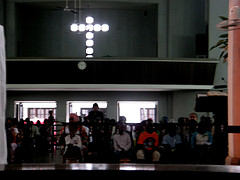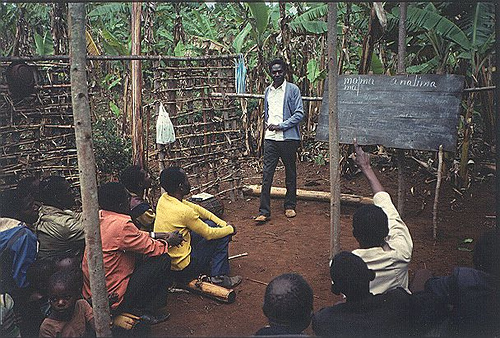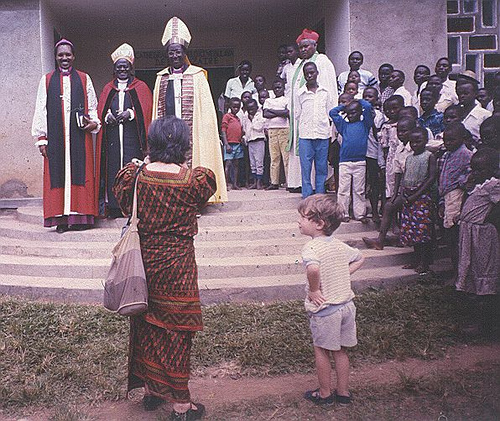 Continuing an age-old debate–is religion the “opium of the people” or can it be a catalyst for social change?–Congolese blogger Blaise Mantoto at UDPS Liege says the Congo’s Christian revivalist churches, which he cynically refers to as “for-profit spiritual shops,”
Continuing an age-old debate–is religion the “opium of the people” or can it be a catalyst for social change?–Congolese blogger Blaise Mantoto at UDPS Liege says the Congo’s Christian revivalist churches, which he cynically refers to as “for-profit spiritual shops,”
encourage political disengagement [Fr]. He calls on revivalist churches to rewrite their missions, arguing they should inspire their followers to improve their social and economic situation through political activism.
UDPS Liege is the Belgium-based branch of the Union for Democracy and Social Progress, a major Congolese opposition party and a vocal critic of Joseph Kabila, the President of the Democratic Republic of Congo.
Revivalist and charismatic churches have become increasingly popular in the Congo–at the expense of Catholic churches–by offering magical and miraculous solutions to the misery and insecurity Congolese have faced for decades. (These churches have also made news for making money off of the cruel exorcisms of child witches.)
But whether or not these churches encourage apathy, not everyone agrees that religion and politics should mix.
On what should be given to Caesar
 Mantoto cites a 2005 study of the capital, Kinshasa, by REEJER (Réseau des Educateurs des Enfants et Jeunes de la Rue) and the University of Kinshasa which found that each of the city's districts was home, on average, to 300 revivalist churches.
Mantoto cites a 2005 study of the capital, Kinshasa, by REEJER (Réseau des Educateurs des Enfants et Jeunes de la Rue) and the University of Kinshasa which found that each of the city's districts was home, on average, to 300 revivalist churches.
He writes:
Ces églises incitent , pour la plupart, leurs adeptes à prendre de la distance vis-à-vis de la politique en s’appuyant sur l’ ingénieuse déclaration de Jésus résumée en ces termes: ” Donnez à César ce qui est à César et à Dieu ce qui est à Dieu ” interprétée de manière abusive pour leur dire « laissez la politique aux politiciens , ne vous immiscez pas »
Répondre qu’il faut payer l’impôt, c’est se faire considérer comme un sujet docile de l’occupant, voire un collaborateur actif. Répondre le contraire, c’est se ranger parmi les héritiers de Juda le Gaulonite, qui avait recommandé de ne pas payer l’impôt. Jésus s’en tire en montrant une pièce : « De qui est cette image ? – De césar – Eh bien, donnez à César ce qui est à César et à Dieu ce qui est à Dieu » (Jean Duquesne, Jésus, p. 185)
Religion should engage oppressed peoples to improve their condition
Mantoto argues this is not a “the solemn call of Christ for the separation of Church and State” and that it should not be used to “hold back a whole people from participating in the building of their social and economic well-being.”
Les églises dites de réveil, porteuses pour la plupart, de cette interprétation erronée, tronquée, démobilisatrice, profitant du dénuement du peuple congolais, l’enferment dans un conditionnement avilissant du type « Dites Amen, mon frère et ma sœur » au lieu de susciter en lui, l’éveil de l’esprit critique et d’analyse indispensable à une prise de conscience des enjeux liés à son avenir, à celui de ses filles et fils et à celui de son territoire en occupation progressive par des armées étrangères : angolaise, rwandaise, ougandaise, burundaise.

Revivalist churches benefit from misery, from the Kabila regime
Ce qui est paradoxal dans le chef de certains de pasteurs tenanciers de ces boutiques spirituelles à but lucratif, c’est que tout en se réclamant apolitiques, ils sont devenus des lieutenants ou des généraux au service du pouvoir de Kinshasa. Ils pactisent avec ces politiques véreux qui paupérisent le peuple congolais en échange de l’endormissement de ce dernier, au nom de cette interprétation…Ces pasteurs « collabo » ne s’interrogent pas quand il s’agit de faire des affaires nébuleuses avec le régime de Kabila. Pourquoi leur foi ne leur interdit pas de se remplir les poches avec l’argent de César, plutôt de Joseph Kabila et de sa bande ? Alors pourquoi contraindre leurs adeptes à se désintéresser de la politique si eux- mêmes y sont très attachés, si eux-mêmes en sont des mouchards ?
Revivalist churches should rewrite their missions
Il me semble que le temps est venu pour ces pasteurs et ces églises d’intégrer désormais dans leur mission apostolique et prophétique, la lutte pour la libération du peuple congolais comme l’ont fait jadis Kimpa Vita, Simon Kimbangu, cardinal Malula, cardinal Etsou …ou encore comme le font de nos jours, Bundu dia Kongo sous l’instigation de Ne Muanda Nsemi, l’église catholique par l’entremise du Conseil Episcopal National Congolais (Cenco) ou encore par celle de communautés ecclésiales vivantes de base (CEVB)…
Cette lutte devra s’inscrire dans une perspective de démocratie participative, c’est à dire dans une dynamique consistant à inciter les croyants, les chrétiens… à s’intéresser voire se réapproprier le contrôle de la gestion politique du pays, à exiger des politiques des engagements précis sur des questions liées au bien-être social de la population, à se réserver le droit démocratique et constitutionnel de poser des actions concrètes et d’envergure pour faire pression sur les gouvernants. On se souviendra que la marche de chrétiens du 16 février1992 avait montré, en son temps, que les chrétiens mobilisés pouvaient faire bouger bien des choses. C’était l’initiative d’un groupe de religieux et intellectuels laïcs, tous catholique, dans le cadre du groupe « Amos » . Pourquoi pas s’inspirer de cette initiative aujourd’hui?
Ainsi, nous en appelons à la hiérarchie des églises : catholique, protestante, indépendante ou de « réveil » sans oublier les imams, de faire prendre conscience aux croyants, aux chrétiens que la reconstruction du Congo-Kinshasa ne peut se faire sans leur implication active dans la surveillance de la gestion du pays et la dénonciation de toute mauvaise gouvernance au travers des « actions-citoyen » concrètes et d’envergures. C’est ainsi que l’on passera entre autre de la religiosité à la libération tous azimuts, du peuple congolais.

But should religion and politics mix?
Hasn't religious involvement in politics often been, throughout history, a recipe for disaster?
This is exactly the question that Alex Engwete addresses in a comment on the UDPS Liege blog. He agrees that churches have an adverse effect on political engagement:
Mais là où je disconviens avec votre position, c’est quand vous encouragez ces mouvements religieux à s’ingérer activement, en tant que groupes, dans les questions politiques. C’est une chose que d’encourager les « croyants » en tant que citoyens à prendre une part active dans les affaires de la cité dans des groupes de société civile ou des groupements politiques. Et vous faites vous-même mention de certains mouvements religieux qui ne seraient que des pions au service du pouvoir en place. Qu’est-ce qui empêcherait ceux que vous appelez des « tenanciers des boutiques spirituelles » de jouer le même jeu de l’autre côté du terrain ? Pire, vous nous apprenez qu’il y aurait même des « mouchards » parmi eux, ce qui ravale ces gens au niveau des délateurs honnis dans toutes les sociétés respectables du monde.
C’est pour cette raison que les grandes démocraties occidentales ont érigé le principe de la séparation étanche des églises et de l’Etat…Eh bien, quand l’église et l’Etat se confondaient, c’étaient des régimes monarchiques et totalitaires dans lesquels la religion du Roi était la Religion officielle du pays et de chaque citoyen. Et gare au citoyen qui s’avisait à afficher une autre religion—là où cette alternative pouvait exister. Je ne vous rappellerais pas ici les tortures et les crimes commis par l’Eglise Catholique au cours de l’Inquisition avec, entre autres, le bûcher pour ceux déclarés « sorciers » ou « possédés par les démons »—surtout les femmes, comme Jeanne d’Arc. Je ne vous rappellerais quand même pas les guerres de religion en France entre Catholiques et Protestants—avec le Massacre de la Saint-Barthélemy, épuration religieuse des Protestants orchestrés par le Roi de France. Je ne vous rappellerais non plus le nom de tous ces savants dont les découvertes contredisaient les doctrines de l’Eglise et qui étaient condamnés à la peine de mort ou excommuniés… C’était l’intolérance la plus sauvage !
C’est l’intolérance la plus sauvage même aujourd’hui—regardez les théocraties de l’Iran et de l’Arabie Saoudite avec leur sharia, ou l’Afghanistan à l’époque des Talibans—les fameux « étudiants en théologie », ou encore Al Qaeda, la Lord Resistance Army de John Kony en Ouganda, ou, plus près de chez nous, le « Bundu dia Kongo » que vous embrassez, me semble-t-il, sans en connaître le précepte fondamental qui est le suivant : l’érection d’une théocratie Kongo sur le territoire de l’ancien territoire Kongo (qui comprend le nord de l’Angola et le sud du Congo-Brazzaville) parce que ce groupe ethnique est l’heureux élu qui devra se séparer de la RDC pour y vivre dans une utopie messianique ! Comme vous pouvez l’imaginer, les Bakongo libres-penseurs n’auront pas droit de cité dans ce royaume (« bundu » en Kikongo signifie bien « royaume »).
La « laïcité » que vous invoquez en passant a été justement introduite avec le Siècle des Lumières au 18ème Siècle qui a érigé la Raison et l’Humanisme dans les affaires humaines—pour ainsi en arriver à la tolérance religieuse, philosophique, et à la connaissance scientifique. On a d’ailleurs appelé ce siècle Le Siècle des Philosophes, siècle à partir duquel on a commencé à voir ce qu’était vraiment la religion : un tissu d’histoires à dormir debout, sans tête ni queue, sans aucune emprise sur le réel…
Photo credits: 1. A church in Kinshasa on election day, October 29, 2006 by Flickr user epape; 2. Paroisse Mbanza Mvuluzi by Flickr user Fred R., also a Global Voices contributor and author of Extra Extra; 3. An outdoor church in Bukavu holding adult literacy classes by Flickr user crunklygill; and 4. An assemblage of Congolese bishops, also by crinklygill.







9 comments
I do not understand at all this habit of attacking Christianity and forget the main responsibles persons and organizations.
If there is no electricity in your house, dare you accuse the baker who lives next to your door? Won’t he say that he has met a fool?
For the moment, here are the people who thanks to mystical powers received from Lucifer are ruling the nations of the whole world: freemassons, rosicrusians, skull and bones, illuminatis, bilderbergers, members of Jason group, members of the council on foreign relations, club of Roma and you can name the rest.
Why, yes, I say why don’t you ask them account on the move of the world they have been leading and managing for millenaries?
Enough is enough and stpo foolish statements about Pastors ans churches. Of course, we will soon govern the world, but please wait until we are in power over countries and private organizations and you will be then entitled to put your questions to us.
Go and see the right people who have been ruling up to now and put them your questions and please keep quiet as far the Church of the Lord JESUS-CHRIST is concerned. We are slaves of GOD, not of men. We feed on the Holy Blood plus the Holy Flesh of our Lord JESUS-CHRIST and not at all on garbagges.
Rev. Apostle Joseph TOUBI
http://www.worldwiderevival.org
bonjour ngai na zali na hong kong na lingi na zwa ba nouvele ya paroisse bundu dia kongo merci mpondo job
Thanks for these kind of talk, because it has been long time that peole are not being callenged with the real words.
however,am one of the pastors who are pastoring Charismatic churches(EL SHADDAI CHURCH). I stay in Uvira, south Kivu, in D.R.Congo.
My advise is just simple, when peolpe think or talk some thing, it si not good to think by analogy( just deciding in block,) this thinking is not based on the real research done. I know some good churches that are teaching real issues that are happening in our country and yet they are charismatic churches. exemple: My church, I completed from victroria University of canada, and we were tought to teach all the dimension of life, and that wha twe do.
I bukavu for example there other good churches.
But one thing that I can agree with you people is that many churches didnot teach, and do not teach.
but Politics has to go together with church, because if we have very bad leaders, even the decision making will be very bad ans imagine the outcome of ,even, the church.
so it is good to encourge people to change some way of teaching. I think some do not do it not because they want but by ignorance, there for pastors should go for traingin before they work with power.
pastor alembe
El Shaddai church in Uvira/DRC
tel 243 994058105
greater greetings of christ Jesus .from missionary Evangel moses joshua
dear in christ
by the power of the holy spirit
we have being moov to come crusade to congo
but we have not yet no any church or pastor .e.t.c
so can i have pastor”s emali add and evanglist email add
or church leidas email address
and tel numbers 2008 crusade in congo
A BIG ALMIGHTY BLESS TO ALL IN THE CITY OF CONGO
THANKS
YOURS IN HIM
MISSION EVANGEL
JOSHUA
MOSES
I think that this an important topic for discussion, particularly with respect to the D.R.C. I myself am planning to visit the Kivu Provinces later in this year, to help with education projects associated with Heal Africa, in Goma, and other efforts in Bukavu.
I have been a film maker for twenty years, and have lived in Europe and the Etats-Unis, and have had the blessing of working with people in some 30 countries arouund the world on film projects.
I believe that it is the form of ecumenical understanding and diplomacy that has helped me find bridges between myself and my world. My Catholic faith has also greatly laid foundations of compassion and social action. Whilst I do all to well understand that many persons pervert the teachings of their faith to suit convenient, comfortable, and political ends, not all persons have done so.
And there are many examples of people who have made a quiet progressive form of God’s presence known in the recent world; Father Charles de Foucauld and Father Henri Le Saux are two that come quickly to mind. The whole topic of Liberation Theology touches on the power that the Church can have to bring about solidarity and social change for those who are downtrodden.
To bait the question of a separation of church and state sounds like a wish for a non-religious but politicized African society, and I believe the statistical trends prove this not to be the case in the here-and-now, nor in any forseeable time to come.
Che Guevara came and went; and the people still suffer. Power has the potential to corrupt. And if one can arm the politicians and the political representatives with some moral and religious trainiing and develop within those who govern a sense of charity and compassion then there is a healthy role for the religious in a healthy society.
Charlatans can be found in any subsection of a society. Along with proverbial opiates. I think the topic is the church in the D.R.C. pass or fail, but how to establish healthy and critical ecumenical dialogues. Certainly the Catholic Church has a great deal of independence from Kinshasa, but I personally know of many protestant churches with affiliations in the States that are doing amazing work in the D.R.C., and who are raising awareness of the current situation that exists there in the minds and the hearts of caring and giving Americans and Europeans.
In Peace.
Pateur Alembe,ne crains pas le Seigneur JESUS est avec toi.Fortifie toi dans sa parole et il agira.
the world has understood D.R.Congo, according to what is being said through media, or through some people arriving in some points in some cities in the DRC, but did not understand the country as a whole.
the world has know DRC through Mobutu ( former president) glasses, Lumumba; these period of wars,refugies…
but I believe that there are 2 kids of DRC:
one is read DRC, which is know by HIV, war, Conflict, lack of leadership, disorder of all kids,poverty,laziness,lies,
pride, …
there is another DRC that is rising up, which I call green DRC, where by, people are trustworthy, deligent,wealthy,hardworking, very strong leadership, where churches are taking the lead again, restored.
this DRC, is not talked over the media, but people who see it, come in the ground and look at it themselves.
that is why before talking about something, it is better to understant very closely and try to be so balance without any feeling of biase.
Wait and you will see,
Pastor Steven
Elshaddai – Uvira
D.R. congo
Tel. +243 994058105
Conheçam a origem de Roque Pinto de Miranda e a sua atuação em Juazeiro do Norte – ce, ao lado do Padre Cícero Romão Batista. Pois, Roque Pinto de Miranda é de origem da segunda geração do Rei do Congo; seus pais (Caetano Pinto de Miranda e Rosalina de Oliveira) vieram para o Brasil por volta do Séc. XIX. Ficamos muito gratos pela a atenção de vocês.
Vizite este blog:e conheça a antropologia de Roque Pinto de Miranda
a sua história e sua origem sobrinho de um segunda geração do rei do congo
Brasil.